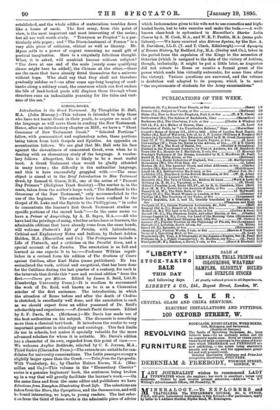SCHOOL-BOOKS.
Introduction to lhe Greek Testament. By Theophilus D. Hall, M.A. (John Murray.)—This volume is intended to help those who have not learnt Greek in their youth, to acquire so much of the language as will serve them in reading the New Testament. Hence, after an introductory chapter on MSS., we have a "Short Grammar of New Testament Greek." "Selected Portions" follow, with grammatical and explanatory notes, these portions being taken from both Gospels and Epistles. An appendix on accentuation follows. We are glad that Mr. Hall sets his face against the slovenliness of unaccented Greek, even when he is dealing with an elementary study of the language. A vocabu- lary follows. Altogether, this is likely to be a most useful book. A Greek Testament class would be gladly attended in many towns ; the difficulty is the unfamiliar language, and this is here successfully grappled with. —The same object is aimed at in the Brief Introduction to New Testament Greek, by Samuel G. Green, D.D., one of the series of "Present Day Primers" (Religious Tract Society).—The matter is, in the main, taken from the author's large work, " The Handbook to the Grammar of the New Testament," only accommodated to the use of the beginner. The extracts have been confined to the Gospel of St. Luke and the Epistle to the Phillippians, " in order to concentrate the learner's first Greek Testament studies on specific portions of the sacred book."—In the same series we
have a Primer of Assyriology, by A. H. Sayce, who have had the privilege of using, whether as teachers or learners, the admirable editions that have already come from the same hands, will welcome Plutarch's Life of Pericles, with Introduction, Critical and Explanatory Notes and Indices, by Hubert Ashton Holden, M.A. (Macmillan and Co.) The Prolegomena include a Life of Plutarch, and a criticism on the Parallel Lives, and a special account of the Pericles. The annotation is as full and learned as one expects it to be.—Professor Wilkins repub- lishes in a revised form his edition of The Orations of Cicero against Catilina, after Karl Halm (same publishers). He has assimilated the work, critical and exegetical, that has been done for the Catilines during the last quarter of a century, for such is the intervals that divide this "new and revised edition" from the first. —Cicero pro Milone. Edited by James S. Reid, Litt.D. (Cambridge University Press.)—It is needless to recommend the work of Dr. Reid, well known as he is as a Ciceronian scholar of the first eminence. The introduction, in which the situation of Rome before and after the death of Clodius is sketched, is excellently well done, and the annotation is such as we should expect from an editor possessed of Dr. Reid's scholarship and experience.—P. Conwli Taciti Germania. Edited by R. F. Davis, M.A. (Methuen.)—Mr. Davis has made use of the best authorities on his subject. The Germania is something more than a classical text-book. It introduces the reader to very important questions in ethnology and sociology. This fact limits its use in schools, but makes it specially valuable for the more advanced scholars for whom it is suitable. Mr. Davis's edition has a character of its own, regarded from this point of view.— We welcome Anglice Recidenda, selected by C. S. Jerram, MA, Third Series (Clarendon Press.)—The extracts are suitable for can- didates for university examinations. The Latin passages occupy a slightly larger space than the Greek.—Tales from the Cyropcedia. With Vocabulary, &e., by Charles Haines Keene, M.A. (Mac- millan and Co.)—This volume in the "Elementary Classics" series is a genuine beginners' book, the sentences being broken up in a way that will greatly facilitate the learner's work.—On the same lines and from the same editor and publishers we have Selections from Xenophon Illustrating Greek Life. The selections are takenfrom the Hiero, the Cynegeticus, and the Oeconomicus, and will ba found interesting, we hope, to young readers. The last selec- LI= from the third of these works is the admirable piece of advice
which Ischomachns gives to his wife not to use cosmetics and high- heeled boots, butte take exercise and make the beds.—A well- known class-book is epitomised in Macmillan's Shorter Latin Course by A. M. Cook, M.A., and W. E. P. Pantin, M.A. (same pub- lishers).—We have received also Hebrew Syntax, by the Rev. A. B. Davidson, LL.D. (T. and T. Clark, Edinburgh).—A. Synopsis of Roman History, by Bedford Joy, MA. (Seeley and Co.), takes in the period from the expulsion of the Kings to the accession of Octavian (which is assigned to the date of the victory of Actium, though, technically, it might be put a little later, as Augustus did not return to Rome or receive a formal grant of the power which made him virtually autocratic, for some time after the victory). Various questions are answered, and the volume is doubtless well adapted to its purpose, which is to meet "the requirements of students for the Army evaminetions."


































 Previous page
Previous page